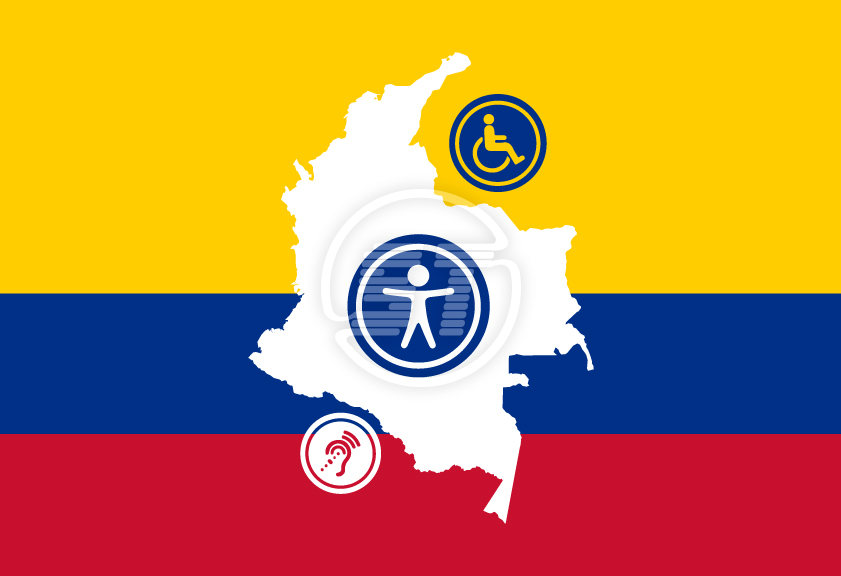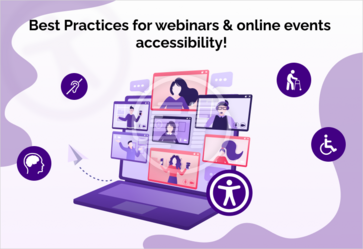Inaccessibility isn’t just personal; it’s a structural and systemic issue.- Emily Ladau
Thus, the entire system needs to incorporate accessibility into its core processes.
In this series of implementing accessibility, Colombia has register significant progress in promoting disability rights, and some of the most crucial legal developments are Law 1618 and Law 1680 of 2013. The legislation was designed to guarantee the full and effective inclusion of people with disabilities in society, ensuring their rights are protected and respected in each facet of life.
This article covers important information about Colombia Law 1618 (2013) & Columbia Law 1680 (2013) and explains how they have shaped the lives of individuals with disabilities.
Read along!
The history and purpose of Law 1618 (2013)
Before the enactment of Law 1618, Colombia had established foundational legislation for disability rights with Law 361 of 1997, which created mechanisms for the social integration of people with disabilities. However, the need for more comprehensive measures became evident over time, leading to the development of Law 1618 of 2013.
Law 1618 was developed with a clear objective, which is to establish the necessary conditions to ensure that people with disabilities can fully exercise their rights without any discrimination. The law aligns with international human rights treaties, particularly the United Nations Convention on the Rights of Persons with Disabilities (CRPD), to which Colombia is a signatory. Colombia ratified CRPD in 2009 and enacted the Law 1618 in the year 2013.
This law aims to promote accessibility, equal opportunities, and social inclusion across all sectors, reinforcing the Colombian government’s commitment to building a more inclusive society.
Key provisions of Law 1618
Law 1618 (2013) sets forth obligations for both public and private institutions to assure the rights of people with disabilities. Some of its important provisions include:
- Non-discrimination and equal rights
The law establishes the right to equality and prohibits any form of discrimination against individuals with disabilities. It mandates all public and private entities to provide necessary accommodations and services to ensure inclusion.
- Inclusive education
Educational institutions must implement inclusive policies to ensure that every student with disabilities have equal access to education. This includes:
- The removal of barriers in learning environments.
- Training for teachers in inclusive education.
- The provision of assistive technologies and support services.
- Accessibility in public spaces and transport
A fundamental aspect of the law is ensuring that public spaces, transportation, and digital platforms are fully accessible. Some crucial measures include:
- Adapting public buildings, sidewalks, and transportation services.
- Implementing sign language interpretation in public institutions.
- Ensuring digital content is accessible to all users under WCAG 2.1 and higher versions.
- Employment rights and workplace inclusion
Employers are required to provide equal job opportunities for individuals with disabilities. The law encourages organizations to hire and support disabled employees by:
- Offering reasonable workplace accommodations.
- Enforcing anti-discrimination policies.
- Healthcare and rehabilitation services
Law 1618 ensures that people with disabilities have access to comprehensive healthcare, including rehabilitation programs, specialized treatments, and mental health support. Healthcare providers must implement accessibility best practices into their services to accommodate different disabilities.
- Social protection and support services
The government is responsible for providing financial assistance, legal aid, and support programs for individuals with disabilities and their families. Moreover, government’s social programs focus on independent living, usage of assistive technologies, and community integration.
Detailed information on the Colombia Law 1618 (2013).
Colombia Law 1680 of 2013 – Background and provisions!
This law is another significant legislative measure aimed at ensuring the rights of individuals with vision impairments. Enacted on November 20, 2013, this law guarantees autonomous and independent access to all information and communication technologies (ICTs) for these individuals.
Provisions:
To ensure that blind and low-vision individuals have autonomous and independent access to ICTs, facilitating their full inclusion and participation in society.
The national government is mandated to develop policies that guarantee access to information, communications, knowledge, employment, education, and ICTs for blind and low-vision individuals, in alignment with Law 1346 of 2009, which ratified the UN Convention on the Rights of Persons with Disabilities.
The Ministry of Information and Communications Technologies is responsible for acquiring screen reader software to facilitate access, use, and appropriation of ICTs by blind and low-vision individuals, thereby promoting their autonomy and independence.
Legal validation:
In 2015, the Constitutional Court of Colombia upheld the constitutionality of Law 1680 through ruling C-035, affirming its alignment with national and international human rights standards.
International alignment:
Law 1689 is consistent with Colombia’s commitments under international human rights treaties, particularly the UN Convention on the Rights of Person with Disabilities, which Colombia ratified through Law 1346 of 2009.
Impact:
The enactment of Law 1680 has been pivotal in recognizing and safeguarding the rights of blind and low-vision individuals in Colombia. It has facilitated the provision of free reading tools, such as JAWS screen reader software and MAGic screen magnifier software, enabling these individuals to exercise their rights autonomously and independently.
Official document of the Colombia Law 1680 (2013).
Influence of these Laws on Colombian society!
The laws have led to profound improvements in disability rights. Some notable impacts include:
- Increased accessibility in public spaces and services.
- Improved awareness and advocacy for disability inclusion.
- Expansion of inclusive education programs across the country.
- Growth in employment opportunities for people with disabilities.
Despite these and many other advancements, the law’s full implementation remains a challenge, requiring more public participation and government commitment.
All in One Accessibility provide website accessibility compliance improvements with Colombia Law 1680 of 2013 and 1618 of 2013.
Future outlook of the laws!
The Laws 1618 and 1680 have contributed significantly to advancing disability rights in Colombia. Awareness campaigns, policy improvements, and increased accessibility measures have positively uplifted many lives. However, continuous and thoughtful efforts are required to bridge the gap between legal provisions and real-life implementation.
The Colombian government, along with civil society organizations, continues to work on improving enforcement mechanisms and ensuring that people with disabilities enjoy their rights and opportunities they deserve.
In short, Colombia Law 1618 (2013) and Colombia Law 1680 (2013) are a crucial step toward building a more inclusive society. Its framework provides a strong foundation for promoting the dignity, rights, and well-being of people with disabilities.
We provide website WCAG 2.1 and 2.2 Level A, AA, AAA remediation services, website compliance audit, VPAT (Voluntary Product Accessibility Template) accessibility conformance report, accessibility document remediation, ongoing website accessibility monitoring, accessibility training, consulting, and support for enhancing accessibility compliance for international standards including Colombia Law 1618 (2013) and 1680 (2013). Reach out hello@skynettechnologies.com to know more.


